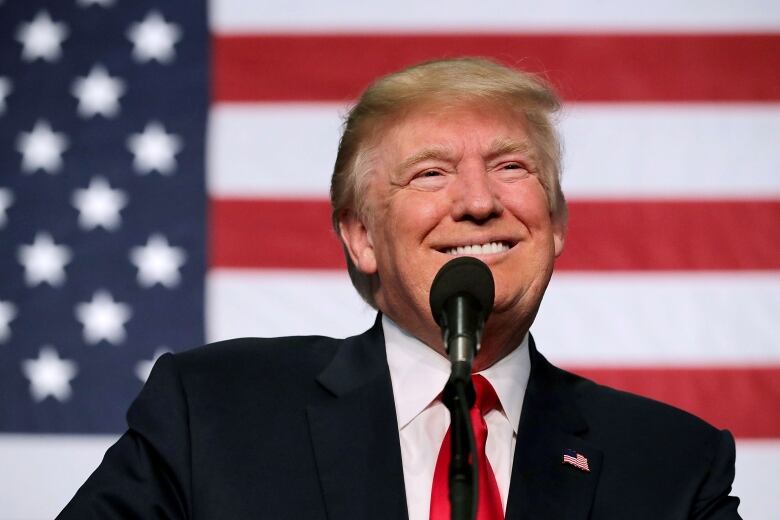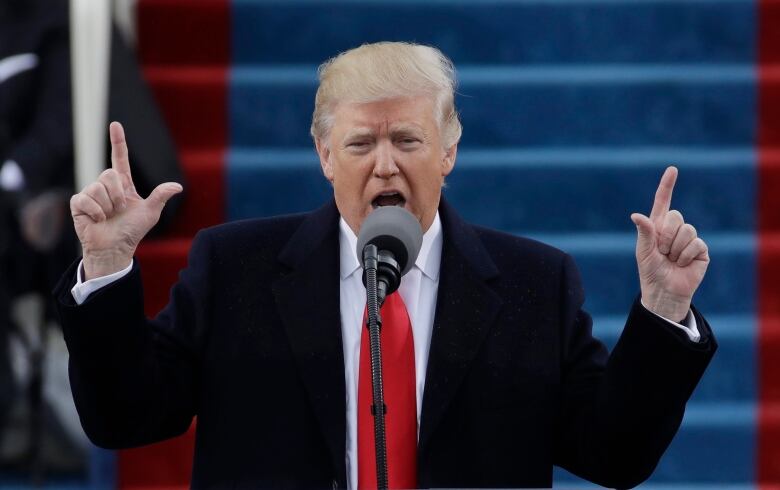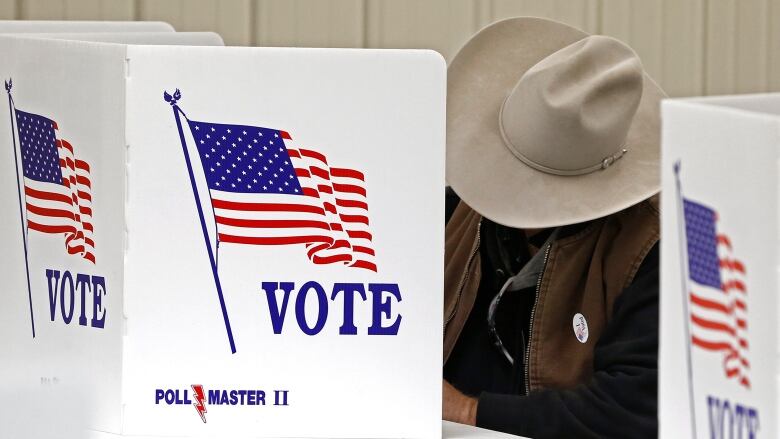The Trump lexicon: a guide to 'alternative facts' and 'MAGA'
U.S. president introducing new terms to the political conversation

U.S. President Donald Trump often studs his speech with colourful turns of phrase that are usually hyperbolic, typically patriotic and at times plain puzzling. Similarly, Trump's staff has introduced a series of new terms such as "alternative facts" and "undercover voters" into the discourse.
The president, who once famously claimed he "had the best words,"is finding his language more closely scrutinized than ever, now that he hastaken office.
Here's a list of the Trump team'smottos and expressions used on the campaign trail and now inthe office of the president.
Alternative facts
Who said it: Trump adviser KellyanneConway on Jan. 22, 2017.
What was said:"You're saying it's a falsehood. And they're giving Sean Spicer, our press secretary gave alternative facts."
Context: Conway introduced the term "alternative facts"when defending White House press secretarySean Spicer. Earlier, Spicer had controversially asserted that Trump's inauguration was "the largest audience ever to witness an inauguration, period, both in person and around the globe."When pressed by Meet the Press host Chuck Todd, Conway replied that Spicer had presented "alternative facts." Todd replied, "Look, alternative facts are not facts, they're falsehoods."
"Alternative facts are not facts. They are falsehoods," Chuck Todd tells Pres. Trump's counselor Kellyanne Conway this morning. WATCH: pic.twitter.com/Ao005dQ13r
—@MeetThePressSubtext: The debate over the term reflects an uneasy tension between the Trump administration and some members of the media. Trump has asserted that journalists are "among the most dishonest human beings on Earth." His staff have similarly said the media is attempting to discredithis presidency.Some news organizations have pushed back, saying it is their job to question inconsistencies.
Buzz factor: Editors ofthe Merriam-Webster dictionary later weighed in on the debate with a tweet offering the definition of the word "fact."
A fact is a piece of information presented as having objective reality. https://t.co/gCKRZZm23c
—@MerriamWebsterAmerica First

Who said it: Trump in his inauguration speech on Jan. 20, 2017.
What was said:"From this day forward, a new vision will govern our land.From this day forward, it's going to be only America first. America first."
Context:Trump on the campaign trail had described himself as "America First,"a theme he would revisit in his inauguration speech. Trump used the term to describe his philosophy that Americans must benefit from every decisionon trade, taxes and foreign policy.
Controversy: The Anti-Defamation League appealed to Trump in April 2016, when Trump used the term on the campaign trail. They urged him to abandon it, saying it had a complicated history in the U.S. dating back to 1940 when a group of isolationists assembled under its banner. America First, which included notable personalities, among themaviator Charles Lindbergh, was accused of spreading anti-Semitic and offensive stereotypes.
Birther
Who said it:The birtherrumours questioning Barack Obama's citizenship circulated on the political fringes without gaining traction beforeTrump began asking questions in2011 on television talk shows.
What was said:
An 'extremely credible source' has called my office and told me that @BarackObama's birth certificate is a fraud.
—@realDonaldTrumpContext:Trump questioned Obama'scitizenship and religion for five years before relenting. When he acknowledged Obama was in fact born in Hawaii, he praised himself for having pursued the investigation, saying in a 2016 tweet, "I finished it." Many observers viewed this campaign as a racist attack on the first U.S. black president.
Controversy:Trump later falsely suggested his rival, Democratic candidate Hillary Clinton, had started the birtherrumour.
Drain the swamp
Who said it:Trump on the campaign trail.
What was said:
I will Make Our Government Honest Again -- believe me. But first, I'm going to have to #DrainTheSwamp in DC. https://t.co/m1lMAQPnIb
—@realDonaldTrumpContext:Trump, who sold himself as a Washington outsider,used the popular political phrase and suggested he would tighten lobbying loopholes, patronage and corruption.
Buzz factor:The phrase, which Trump deemed "the hottest expression," was chanted repeatedly at campaign rallies.
Controversy:Trump's cabinet nomineeshave prompted some criticism that Trump in fact hasn't drained the swamp and is rewarding his political friends and business players who have long benefited from federal lobbying. Treasury secretary nominee Steve Mnuchin, for example, was Trump's national finance chairman. Linda McMahon, whom Trump picked to run the Small Business Administration, donated $6 million US to a Trump super PAC in 2016.
Fake news
Who said it: Trump at his first press conference as president-elect on Jan. 12, in response to questions about a secret intelligence file that allegedly containedcompromising personal and financial information.
What was said:"You are fake news," Trump said to a CNN reporter.
Context:The notion of fake news began circulating after the election, when it became clear that a Russian propaganda group had circulated false stories in a bid to influence the election to benefit Trump. Trump used the term during his press conference in an effort to discredit the story about the dossier.
Make America Great Again (MAGA)
Who said it:Trump in 2012, the day after BarackObama defeated Republican presidential candidate Mitt Romney.
What was said:
We have to make America great again!
—@realDonaldTrumpContext:Trump's slogan closely resembles former U.S. president Ronald Reagan's 1980 slogan, "Let's Make America Great Again." MAGA became a central campaign rallying cry.
Buzz factor:Trump's campaign produced hats with the copyrighted slogan. Trump says he sold millions of the $25 US hats, according to the Washington Post.
Shadow or undercovervoters

Who said it:Conwayon the campaign trail in 2016.
What was said:"It's a project we're doing internally. I call it the undercover Trump voter, but it's real."
Context:Conway referred to shadow and undercover voters in August 2016 when Trump was performing poorly in the polls. Conway suggested that there was actually a hidden group of college-educated voterswho were unwilling to tell pollsters that they were voting for the Republican candidatebecause it was seen as socially undesirable.
Buzz factor:Some observers dismissed the term as political spin, saying Trump's camp was in deep denial about how he was performing. But after Trump's victory, which proved many of the polls widely missed the mark, some political watchers concededthere perhaps was a hidden bracket of Trump voters.












_(720p).jpg)


 OFFICIAL HD MUSIC VIDEO.jpg)
.jpg)



























































































